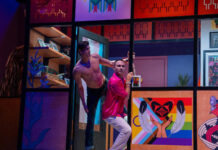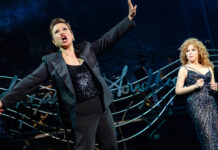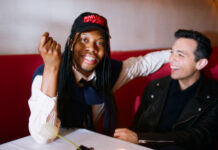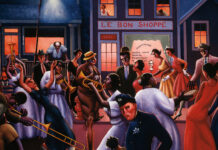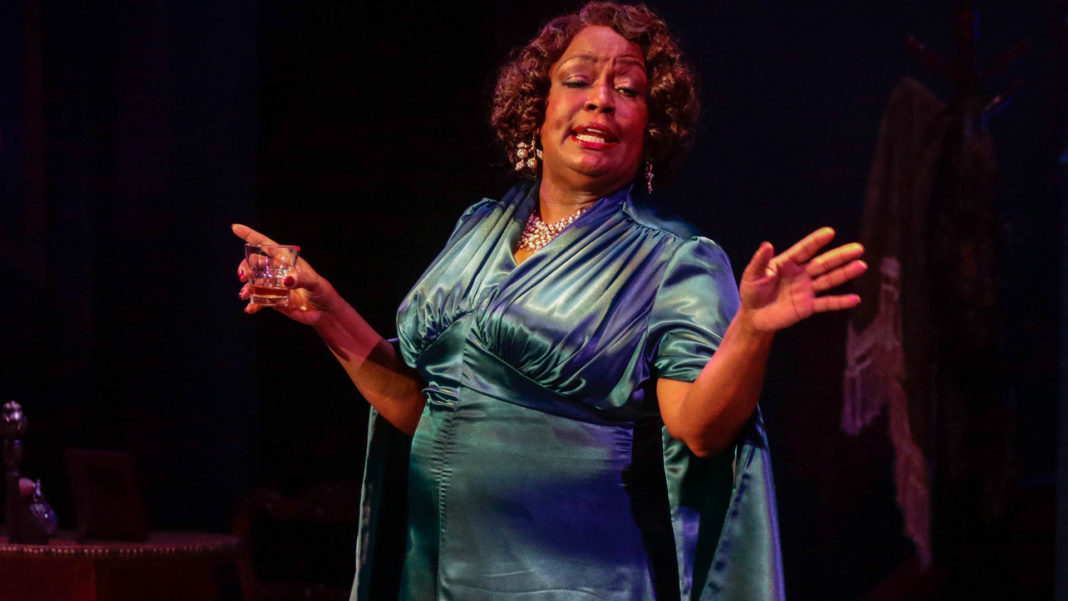Actress Yvette Cason and Sheldon Epps have a long professional association. It began when she appeared in Sisterella at the Pasadena Playhouse and it predates his role as Artistic Director there. She also appeared in Play On, Ray Charles and Stormy Weather– all productions he directed. Now she’s in her fifth show with him as director with Blues in the Night. The musical, a revival of a work Epps first created in 1980, has its official opening tonight at the Lovelace Studio Theatre at The Wallis Annenberg Center for the Performing Arts. It will continue there through May 20th.

Blues in the Night uses primarily blues songs to tell the story of three women (Cason, Bryce Charles and Paulette Ivory) who have one snake of a man in common (Chester Gregory.) Amongst the songs heard in the show are “Wild Women Have the Blues,” “Reckless Blues,” “Lush Life” and “Rough and Ready Man.”
I spoke by phone with Cason about the show, the timeliness of this production and if she’s a lady who sings the blues herself.
Are you a wild woman and do you ever have the blues?
I can be a wild woman within the parameters of the people I feel most comfortable and safe with. And I do have the blues sometimes. I think most women do, people do. I don’t stay in that place very long.
Your character is called “The Lady from the Road.” What can you tell me about these women in the show?
We’re all going through some sort of blues: we’ve been in love, love is gone, love gone wrong, love lost. My particular character has seen better days. She had a nice time traveling around doing what she loves to do. Now she’s in a cheap hotel with these other tenants who come and go. She’s got a lot of memories that are both good and bad.

One of the things that intrigues me about this show is the vast number of songs written by women like Bessie Smith, ida Fox, Ann Ronnell, Leola and Wesley Wilson, Alberta Hunter and more. Do women understand the blues more than men?
That’s a good question. I don’t want to say one knows more or less than the other. I think the blues for a man may be different than blues for a woman. What men have to do in their world as opposed to what we do as women; my blues are different than my husband’s blues. They are blues nonetheless. I could be selfish and say we got more blues. [She then lets out an infectious laugh.] We’re mothers and wives. But men have to go out and make that dollar and take care of the family.
As for the songs, Sheldon has been so smart. He conceived the piece so he knows these women. He knows the music, the period. He’s just really smart and brings so much that is helpful to the actor for our journey.

Does singing this material challenge you in ways that singing other types of music doesn’t?
It takes you to some places that you may not particularly want to go; things you don’t want to think about. The women who were singing the blues back in the day, their lives were very different in so many different ways in terms of segregation and not having the type of celebrity they should have had. For them to sing the blues they were living the blues. I don’t live the blues. My life is pretty peachy. When I think about Bessie Smith and the other women, it was rough. And you can hear it in their singing and how they interpret the songs.
Do you think the timing of a show about female empowerment happening at the same time as the #MeToo movement is a coincidence?
Let’s be honest. Metoo, you can hashtag whatever you want. It’s not new. What makes it new is we have the power of social media, the camera and all the other things. This has been going on longer than you and I were part of this world. I think women are empowered and they have a voice and use it and when we have shows like this we get to use it in an entertaining kind of way. It’s very timely.

You were Jennifer Holliday’s understudy for Dreamgirls. I guess you went on a lot. What’s your best memory of doing that show?
I did. [Her laugh returns for a moment.] Dreamgirls was my first theatrical show and first show on Broadway. I think working with Michael Bennett and Michael Peters and Henry Krieger. We’ve lost a lot of cast members unfortunately. My best memory was to be there with the creators of the show.
Kendrick Lamar wins a Pulitzer. Moonlight wins the Oscar. Black Panther rules at the box office. Beyoncé towers over everyone at Coachella. As an African-American woman, how do you reconcile those achievements versus the day-to-day struglges like the recent Starbucks situation that others face?
I’m not going to boycott Starbucks. That’s not a Starbucks problem. That’s a woman who made a decision based on fear. I’m mad at her and the police who took the time to entertain her situation. It’s not everybody. It’s just individual people and all these individuals make up a lot of people. People are people are people. There are bad seeds in every ethnicity. I just want you to come 100% as much as you can. Be real, have good character, have integrity. That’s what I’m teaching my child. What matters is how do you make people feel. We’re a society of so much and we lose site of the goodness and the real stuff.
Jimi Hendrix said “Blues is easy to play, but hard to feel.” Do you agree with him?
I don’t know. I somewhat agree. It’s easy to feel the blues. It depends on where you are in your life. I think you can play it and I think you can feel it. When you listen to Bessie or Billie Holiday – that is nothing but pure pain coming. That’s the blues. I have to access it because I’m not living that life, but I know how to get it. I can think about things that are happening right now or my ancestors. But I’m not living it. I hate to disagree with Jimi, ‘cause I love Jimi. I would love to have that conversation with him. Who knows, maybe he could sway me. Look at him and his life. He was singing the blues.
Photo Credit for all production photos: Lawrence K. Ho


